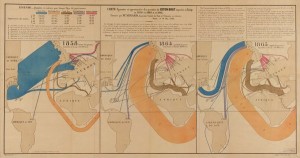Robert Gordon’s magnum opus, [amazon_link id=”0691147728″ target=”_blank” ]The Rise and Fall of American Growth: the US Standard of Living Since the Civil War [/amazon_link](out in mid-January), is going to be an essential read for anyone interested not only in US economic history but also American economic prospects. The book is a comprehensive overview of growth from 1870 on, with a close focus on innovation and productivity. It does not consider at all macroeconomic policy, and is not much interested in events such as the Great Depression or the creation and later collapse of Bretton Woods. This is the supply-side story. This is not a criticism; as it is, the book weighs in at 650 pages – 730 with notes etc.
[amazon_image id=”0691147728″ link=”true” target=”_blank” size=”medium” ]The Rise and Fall of American Growth: The U.S. Standard of Living since the Civil War (The Princeton Economic History of the Western World)[/amazon_image]
There are three sections: the first covers 1870 to 1940; the second 1940-2015; the third is about the sources of growth and why it was fastest from the 1920s to 1950s (this is just about the US so this is earlier than European readers would recognise as the peak growth era) – and is slowing now. The final chapters are a kind of crescendo, for the whole book is organised to support Gordon’s well known thesis that the days of miracle and wonder, the rapid growth era of the early to mid-20th century, is long gone, and slower growth lies ahead of us. As he writes in the introduction: “Our central thesis is that some inventions are more important than others, and that the revolutionary century after the Civil War was made possible by a unique clustering, in the late 19th century, of what we will call the ‘Great Inventions’.” [his italics] By Great Inventions, he means electricity, water supply and sewage systems, the internal combustion engine, radio then TV, and innovations that reduced household drudgery such as refrigerators and washing machines. The core of his argument is that these so transformed health, life expectancy and connectivity that no future invention could possibly have such a dramatic impact on people’s living standards.
Who could argue with the idea that this era saw such dramatic change in human lives? For that matter, it is also hard to argue with the headwinds he notes about growth now: demographic change with ageing populations, and inequality, limiting the mass market for future innovations. The final chapters particularly emphasise the damaging effects on the economy of greatly increased income and wealth inequality. Hear, hear. What I find odd about Gordon’s argument is his insistence that there is a kind of competition between the good old days of ‘great innovations’ and today’s innovations – which are necessarily different.
One issue is the extent to which he ignores all but a limited range of digital innovation; low carbon energy, automated vehicles, new materials such as graphene, gene-based medicine etc. don’t feature. The book claims more recent innovations are occurring mainly in entertainment, communication and information technologies, and presents these as simply less important (while making great play of the importance of radio, telephone and TV earlier). (A minor European carp – he also claims that it is only Americans who invent things now, when it would be more accurate to say it is only Americans who commercialise them to massive scale, especially in digital.)
Sure, we won’t repeat the impact of connecting houses to the electricity grid; but if we can keep them connected while generating power at simlar cost with zero greenhouse gas emissions, well that would be a Great Invention with the potential to utterly transform humanity’s prospects. We won’t see the same gains in life expectancy as with the previous introduction of public health measures and antisepsis, but if we can increase the quality of health and life for the over-60s, that would be a very big deal.
A second issue is that throughout the first two parts of the book, Gordon repeatedly explains why it is not possible to evaluate the impact of inventions through the GDP and price statistics, and therefore through the total factor productivity figures based on them – and then uses the real GDP figures to downplay modern innovation. “This book … focuses on the aspects of improvements of human life that are missing from GDP altogether.” For example, he writes, just as important as the calorific intake, or price of a given quantity of meat, is the fact that Americans’ diets changed from the monotony of ‘hogs’n’hominy’ in the 1870s to a much more varied diet by the 1920s. I wholeheartedly agree with this approach. While the very long run of real GDP figures (the ‘hockey stick of history’) does portray the explosion of living standards under market capitalism, one needs a much richer picture of the qualitative change brought about by innovation and variety. This must include the social consequences too – and the book touches on these, from the rise of the suburbs to the transformation of the social lives of women.
Yet in the later chapters of the book, turning to modern growth, Gordon does an about turn, saying: “The impact of innovations and technological change [since 1970] was measured by their effect on total factor productivity.” If this is going to be the yardstick in the ‘race between the decades’, he should have addressed here the questions about the measurement of GDP and productivity in the modern US economy, based as it is on services and intangibles.
For instance, he says: “Nothing in the history of price index bias compares with the omission of automobile prices from the official price indexes over the entire period from 1900 to 1935.” His data in chapter 5 show a decline in quality-adjusted prices between 1906 and 1940, from $650 to $266, which does not seem to support the broad claim. Even the decline in the per capita ratio of quality adjusted price to nominal disposable income (from 2.47 to 0.46) presented there looks smaller than some other innovation-related price declines, similarly omitted from or understated in, official price indexes. The book does not explain, but it would need to go into the figures in more detail if the argument is to turn on the GDP and TFP statistics. Anyway, there are two points about current and future growth. One is about the extent to which innovation is slower, or its effects less important – case unproven, in my eyes. The other is the issue of headwinds slowing down whatever innovation-driven growth there might otherwise be – a stronger case, well expressed in the final chapters.
The obsession with things having been much better, innovation- and growth-wise, in the old days is an irritation, and does make the reader wonder how much the narrative has been bashed into shape to fit the conclusion. Having said that, the wealth of detail in the book far outweighs this annoyance. It is stuffed with wonderful evocations of the effects of economic growth, with institutional details, with tables and charts of useful historical data. The history is brought alive by such things as recounting the living conditions of different kinds of families – midwestern farms with their space and light, compared with New York tenements – or discussing the effect of food quality standards – dairy products stopped being watered down, but butter lost the distinctive taste and smell of its ‘terroir’. Some parts of the story will be familiar to some readers; if you have read a lot already about the history of the computer industry, or Ford’s creation of the assembly line and the mass market, the capsule versions here will not add much. But the book as a whole is a tremendous achievement. If not for the holiday, I wouldn’t have been able to read it from page 1 to page 650; I’m very glad I was able to do so.


